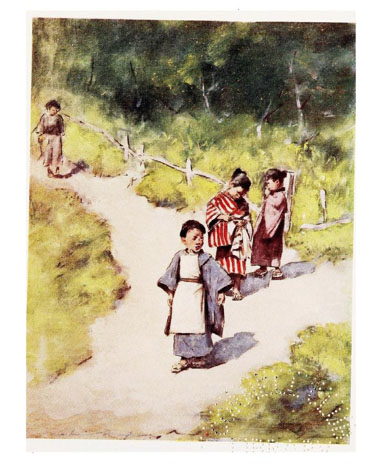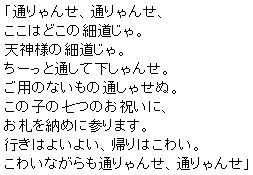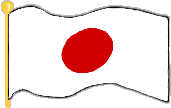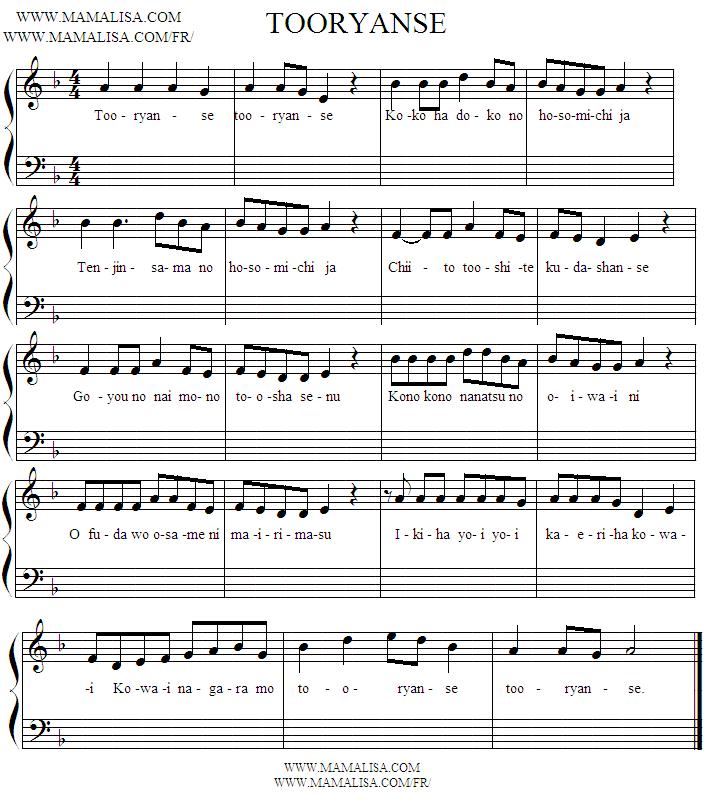通りゃんせ

通りゃんせ
Pass Through, Pass Through (Tooryanse)
Singing Game
Singing Game
(Japanese)
(English)

Pass through, pass through
Where does this narrow path lead?
It is the path to Tenjin Shrine
Please let us pass through
People with no business are usually not allowed through
This child is now seven years old
We've come to make our offering
Going is safe, but not returning
If you are prepared, go through, go through.
Notes
There's a discussion going on about this song on Mama Lisa's World Blog. Come read more about Tooryanse and a Japanese festival called Shichi-go-san, 七五三 (that has a connection to this song).
Game Instructions
This game is similar to London Bridge is Falling Down. Two kids stand face to face, holding hands in the air to form an arch. While singing the song, the other kids pass under the arch. As long as the song is being sung the kids keep going around and under the arch. Whoever is under the arch on the last word of the song gets "caught" by the two kids who are forming the arch with their arms. The one who is caught now replaces one of the kids who was forming the arch and the round continues.
This song can be heard in Japan at crosswalks. The idea is the same as this game: it's safe to cross until the music stops!
Comments
*****
Tooryanse Transliteration
(Romaji - Tōryanse)
Tooryanse tooryanse
Koko ha doko no hosomichi ja
Tenjin-sama no hosomichi ja
Chiito tooshite kudashanse
Goyou no nai mono toosha senu
Konokono nanatsu no oiwai ni
O fuda wo osame ni mairimasu
Ikiha yoi yoi kaeriha kowai
Kowai nagara mo tooryanse tooryanse.
*****
Devon Thagard from "Head, Shoulders, Knees and All That" sent the following translation and comments. Devon went through the meaning of each word to help translate this song into French. We thought his comments about the meanings of the words were interesting to post here:
Tooryanse
Tooryanse (pass through) tooryanse (pass through) (kind of old, regional Japanese)
Koko (here) wa (is) doko (where) no (possessive marker) hosomichi (narrow path) ja (question inflective) (Here is to where's narrow path?) (Where does this narrow path lead?)
Tenjin-sama (Tenjin Shrine) no (possessive marker) hosomichi (narrow path)
ja (question) (Tenjin Shrine's narrow path?) (Is it the path to Tenjin Shrine?)
Chiito (old, regional japanese meaning little.) For example "tooshite" would be 'let us pass through, but prefacing it with Chiito is kind of like saying, 'do you think you could just kind of let us pass through there?"...People use 'chotto' these days. "Matte" would be 'wait'. "Chotto Matte" would be 'wait a second, just a moment') tooshite (let us pass through) kudashanse (could you please...honorific)(kind of let us pass through could you please) (could you please let us pass
through?)
Goyou (business, matter) no (object marker) nai (don't have) mono (people, in this case) toosha senu (can't pass) (business don't have people can't pass) (People with no business can't pass)
Kono (this) ko (child) no ('s) nanatsu (seven) no (possessive marker) oiwai (celebration) ni (to) O (honorific) fuda (offering) wo osame (make) ni (to, in order to) mairimasu (go)
(This child's seventh birthday celebration to offering make in order to go.) (We are going to make an offering for this child's seventh birthday
celebration)
Iki (going) wa (is) yoi (good, safe) yoi (good, safe) kaeri (returning) wa
(is) kowai (scary) (Going is good, good...Returning is scary)
Kowai (scary) nagara (though, while) mo (even, like even though) tooryanse (pass through) tooryanse (pass through) (Scary though even, pass through, pass through) (Even though it's scary, pass though, pass through.)


Thanks!
Thanks!
Thanks and Acknowledgements
Translated by Mama Lisa.
Many thanks to Nathan Yeldell for providing the Japanese text, to Devon Thagard from "Head, Shoulders, Knees and All That" and Knock Knock English (an English school in Tokyo) for the in-depth explanation (below) of the words to this song and to Monique Palomares for the midi.



























